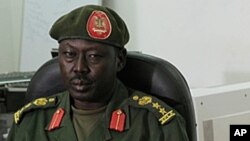NAIROBI —
South Sudan's military spokesman says the armed forces are ready to implement a cease-fire deal signed late Friday, to end months of fighting with anti-government forces. World leaders have welcomed the deal as the humanitarian crisis in the country has reached a critical point.
South Sudan's Colonel Philip Aguer told VOA Saturday the cease-fire order will be passed to all military forces, known as SPLA, in areas of recent fighting.
“The agreement will be simply communicated to all the SPLA division and forces and units and particularly in the three states of Upper Nile, Unity State and Jonglei and it will be implemented,” Aguer said.
President Salva Kiir and his main rival, former vice president Riek Machar, agreed to the cease-fire during a meeting in Addis Ababa, following mounting calls from the international community to end fighting.
Thousands have been killed and hundreds of thousands displaced since December, when a political struggle between the two leaders broke out into violence that has prompted inter-ethnic attacks.
A previous cease-fire signed by representatives of the two sides in January failed to take hold. Aguer says he is more optimistic about the new agreement.
“This time, since it is signed by Riek Machar itself, though we know he has many irregular armies under him, it will help to communicate it to those forces on the ground, and for our side, we don't see any problem,” Aguer said.
Teams from the East African group of nations known as IGAD, which has mediated talks, are expected to monitor the implementation of the cease-fire on the ground.
United Nations Secretary General Ban Ki-moon, who visited South Sudan earlier this week, welcomed the new cease-fire agreement and called for the parties to “immediately translate these commitments into action on the ground.”
U.S. Secretary of State John Kerry hailed the deal as a possible breakthrough.
A United Nations human rights report released this week outlined serious human rights abuses committed by both sides during the conflict, including rape, extrajudicial killings, arbitrary detentions and attacks on civilians in hospitals.
Humanitarian agencies have warned that millions of South Sudanese are at risk of severe food insecurity if the fighting is not halted.
South Sudan's Colonel Philip Aguer told VOA Saturday the cease-fire order will be passed to all military forces, known as SPLA, in areas of recent fighting.
“The agreement will be simply communicated to all the SPLA division and forces and units and particularly in the three states of Upper Nile, Unity State and Jonglei and it will be implemented,” Aguer said.
President Salva Kiir and his main rival, former vice president Riek Machar, agreed to the cease-fire during a meeting in Addis Ababa, following mounting calls from the international community to end fighting.
Thousands have been killed and hundreds of thousands displaced since December, when a political struggle between the two leaders broke out into violence that has prompted inter-ethnic attacks.
A previous cease-fire signed by representatives of the two sides in January failed to take hold. Aguer says he is more optimistic about the new agreement.
“This time, since it is signed by Riek Machar itself, though we know he has many irregular armies under him, it will help to communicate it to those forces on the ground, and for our side, we don't see any problem,” Aguer said.
Teams from the East African group of nations known as IGAD, which has mediated talks, are expected to monitor the implementation of the cease-fire on the ground.
United Nations Secretary General Ban Ki-moon, who visited South Sudan earlier this week, welcomed the new cease-fire agreement and called for the parties to “immediately translate these commitments into action on the ground.”
U.S. Secretary of State John Kerry hailed the deal as a possible breakthrough.
A United Nations human rights report released this week outlined serious human rights abuses committed by both sides during the conflict, including rape, extrajudicial killings, arbitrary detentions and attacks on civilians in hospitals.
Humanitarian agencies have warned that millions of South Sudanese are at risk of severe food insecurity if the fighting is not halted.




